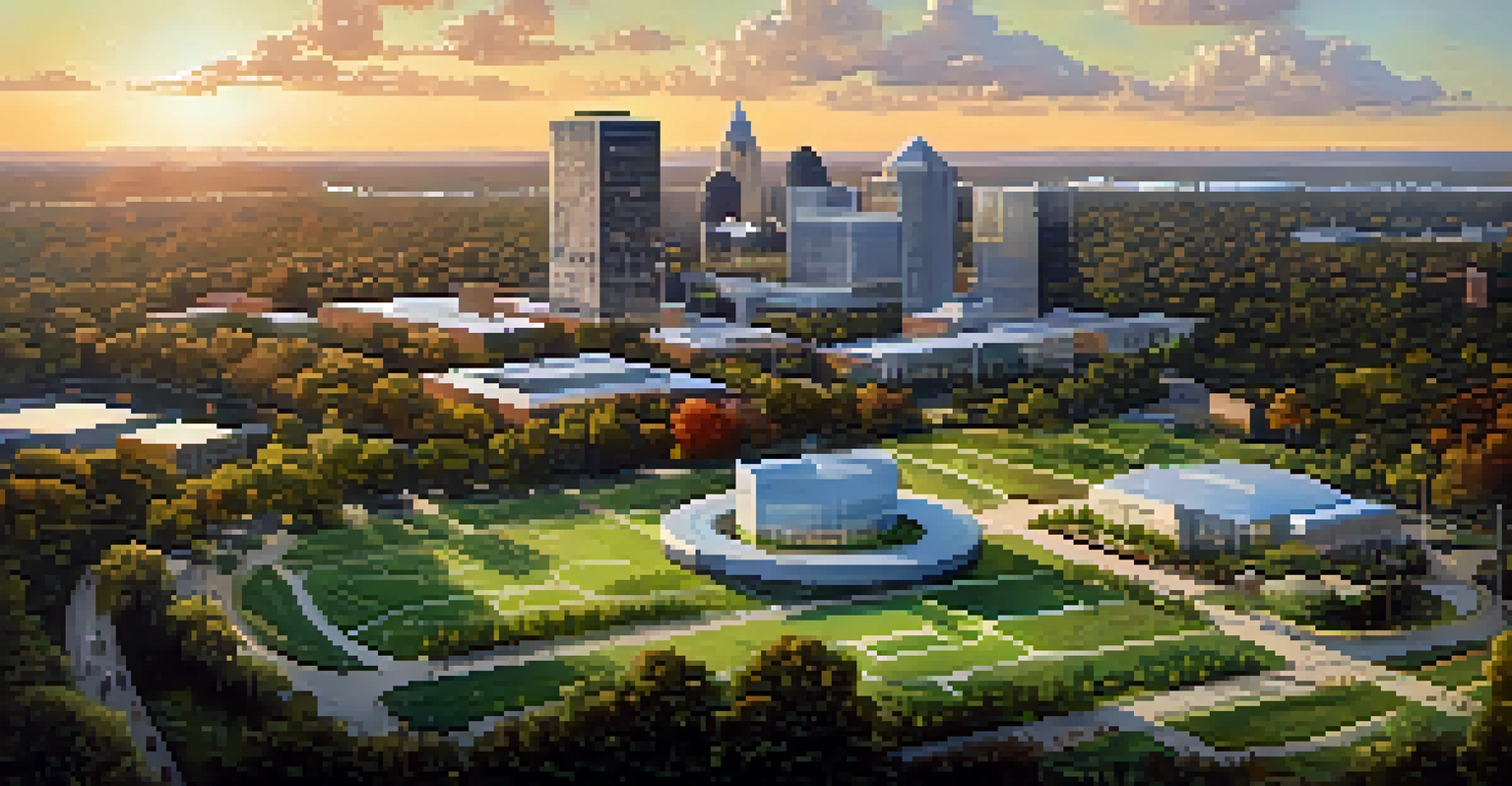Public Policy Effects on Raleigh's Economic Landscape

Overview of Raleigh's Economic Landscape
Raleigh, known for its vibrant tech scene and educational institutions, is part of the Research Triangle, which significantly contributes to its economic growth. The city's economy is diverse, encompassing sectors like technology, healthcare, and education. This mix creates a robust job market and attracts talent from across the nation, making Raleigh a desirable place to live and work.
Public policy is not just a matter of government; it is the framework through which we create the future we envision for our communities.
The combination of private and public sectors plays a crucial role in shaping this landscape. Local government initiatives and policies often drive infrastructure improvements and economic development programs. These efforts not only enhance the quality of life for residents but also position Raleigh as a competitive player in the regional economy.
Understanding the factors that influence Raleigh’s economy requires a closer look at public policies. These policies can range from zoning laws to tax incentives, all of which directly affect business growth and community development. As such, the interplay between public policy and the economy is essential for fostering a thriving environment for businesses and residents alike.
The Role of Local Government Policies
Local government policies are foundational to Raleigh's economic development strategy. By providing incentives for businesses, such as tax breaks and grants, the city encourages investment and job creation. These policies are designed to attract startups and established companies, which in turn contributes to the local economy.

Additionally, local government initiatives often focus on improving infrastructure, such as transportation and public services. Upgraded roads, public transit options, and utilities make Raleigh more appealing to businesses and residents. This investment in infrastructure is critical for supporting the city's continued growth.
Raleigh's Economy Thrives on Diversity
Raleigh's economic growth is fueled by a mix of technology, healthcare, and education sectors, attracting talent and creating a robust job market.
However, it’s important to balance these initiatives with community needs. Policymakers must consider the impact of development on existing neighborhoods and ensure that growth is sustainable. Engaging with the community and incorporating feedback helps create policies that benefit everyone, not just businesses.
Zoning Laws and Economic Development
Zoning laws play a pivotal role in shaping Raleigh's economic landscape by determining how land can be used. These regulations influence where businesses can operate and what types of developments are permitted. By strategically zoning areas for commercial use, Raleigh can foster economic growth and attract new businesses.
The best way to predict the future is to create it.
For instance, mixed-use developments that combine residential and commercial spaces are becoming increasingly popular. They promote walkability and create vibrant communities, which can lead to higher property values and increased local business revenues. These zoning decisions often reflect a broader vision for sustainable urban development.
However, zoning laws can also lead to challenges, such as gentrification or displacement of long-time residents. Policymakers must navigate these complexities to ensure that economic growth does not come at the expense of community integrity. Striking this balance is essential for maintaining Raleigh's unique character while promoting economic vitality.
Impact of State Policies on Local Economy
State policies significantly influence Raleigh's economic landscape, especially through funding and legislative measures. Decisions made at the state level regarding education funding, healthcare access, and transportation infrastructure can have direct effects on local businesses. For example, investments in public education bolster the workforce by ensuring that residents have access to quality education and training.
Furthermore, state tax policies can affect the attractiveness of Raleigh for businesses. Lower corporate tax rates may entice companies to relocate or expand their operations in the area. This influx of businesses leads to job creation and stimulates economic growth, benefiting the local population.
Local Policies Foster Business Growth
Local government initiatives, such as tax incentives and infrastructure improvements, are crucial for encouraging investment and sustaining economic development.
However, reliance on state policies can also pose risks. Changes in leadership or shifts in priorities can lead to fluctuating support for local initiatives. As such, Raleigh must adapt to these changes and continually advocate for policies that align with its economic goals.
Public Investment in Infrastructure
Public investment in infrastructure is crucial for sustaining Raleigh's economic growth. Projects such as highway expansions, public transit enhancements, and the development of public spaces directly influence business operations and overall quality of life. A well-connected city attracts more residents and businesses, creating a cycle of growth and opportunity.
Moreover, investing in technology infrastructure, like high-speed internet access, is essential for supporting the growing tech sector. As more companies rely on digital solutions, having robust internet connectivity becomes a competitive advantage. This investment not only supports local businesses but also attracts new ones looking to capitalize on Raleigh's tech ecosystem.
However, managing these infrastructure projects requires careful planning and funding. Local government must prioritize initiatives that provide the most significant benefits to the community while being mindful of budget constraints. A strategic approach is necessary to ensure that public investment leads to sustainable economic development.
Challenges Faced by Public Policy
Despite the positive impact of public policy on Raleigh's economy, several challenges persist. One major concern is the increasing cost of living, which can outpace wage growth. As more people move to Raleigh for its opportunities, housing demand rises, leading to higher prices that can make it difficult for some residents to afford living in the city.
Additionally, public policy decisions can sometimes be slow to adapt to changing economic conditions. Policymakers may find it challenging to respond quickly to new trends, such as the rise of remote work or shifts in industry demands. This lag can hinder the city's ability to remain competitive and responsive to the needs of its residents and businesses.
Sustainability Shapes Future Policies
As Raleigh grows, future policies will likely focus on sustainability and innovation, ensuring that economic strategies benefit both businesses and the community.
Addressing these challenges requires proactive policymaking and community engagement. By involving residents in the decision-making process, Raleigh can develop policies that reflect the needs of its diverse population. This collaborative approach can lead to more effective solutions that promote economic resilience.
Future Directions for Raleigh's Economy
Looking ahead, Raleigh's economic future will be shaped by both ongoing public policies and emerging trends. As the city continues to grow, it will be essential to foster an environment that supports innovation and entrepreneurship. This means crafting policies that not only attract businesses but also nurture the local startup ecosystem.
Sustainability will likely play a significant role in shaping future policies as well. With increasing awareness of environmental issues, Raleigh may prioritize green initiatives that promote eco-friendly business practices and sustainable development. These efforts can enhance the city's appeal to new businesses and residents who value environmental responsibility.

Ultimately, the collaboration between public policy, community engagement, and economic strategy will be vital in navigating Raleigh's future. By focusing on inclusive growth and adaptability, Raleigh can position itself as a thriving hub that benefits all its residents while continuing to attract new opportunities.